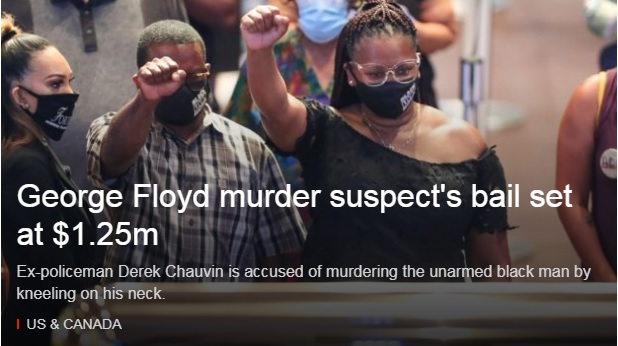
The Minneapolis ex-policeman accused of killing unarmed black man George Floyd has made his first court appearance, where his bail was set at $1.25m (£1m).
Prosecutors cited the "severity of the charges" and public outrage as the reason for upping his bail from $1m.
Derek Chauvin faces charges of second-degree murder and manslaughter. Three other arresting officers are charged with aiding and abetting murder.
Mr Floyd's death in May led to global protests and calls for police reform.
Mr Chauvin, who is white, knelt on Mr Floyd's neck for almost nine minutes while he was being arrested in Minneapolis on 25 May.
He and the three other police officers have since been fired.
Meanwhile, mourners in Houston, Texas, where Mr Floyd lived before moving to Minneapolis, have been viewing his body, publicly on display for six hours at The Fountain of Praise church.
What happened at the bail hearing?
Mr Chauvin, a 19-year police veteran, did not enter a plea as he appeared via teleconference on Monday.
He did not speak during the 15-minute hearing, and was handcuffed and wearing an orange jumpsuit as he sat a small table.
Judge Jeannice M Reding set a bail of $1.25m with no preconditions, or $1m with conditions that include Mr Chauvin not contacting Mr Floyd's family, surrendering his firearms and not working in law enforcement or security as he awaits trial.
His lawyer did not object to the bail price.
Mr Chauvin, 44, is currently being held at the Minnesota state prison in Oak Park Heights, after being transferred several times.
His next court appearance is set for 29 June.
What are the accusations against Chauvin?
He faces three separate charges: unintentional second-degree murder, third-degree murder and second-degree manslaughter, for which the maximum penalties are prison terms of 40, 25 and 10 years respectively.
Further charges could be brought but it appears unlikely he will be accused of first-degree murder as prosecutors would have to prove premeditation, intent and motive, the Associated Press reports.
By bringing multiple charges, prosecutors give jurors a choice and increase the chances of a conviction.
Minneapolis city council has voted to ban chokeholds and neck restraints by police officers, and Democrats in Congress have unveiled sweeping legislation on police reform.

